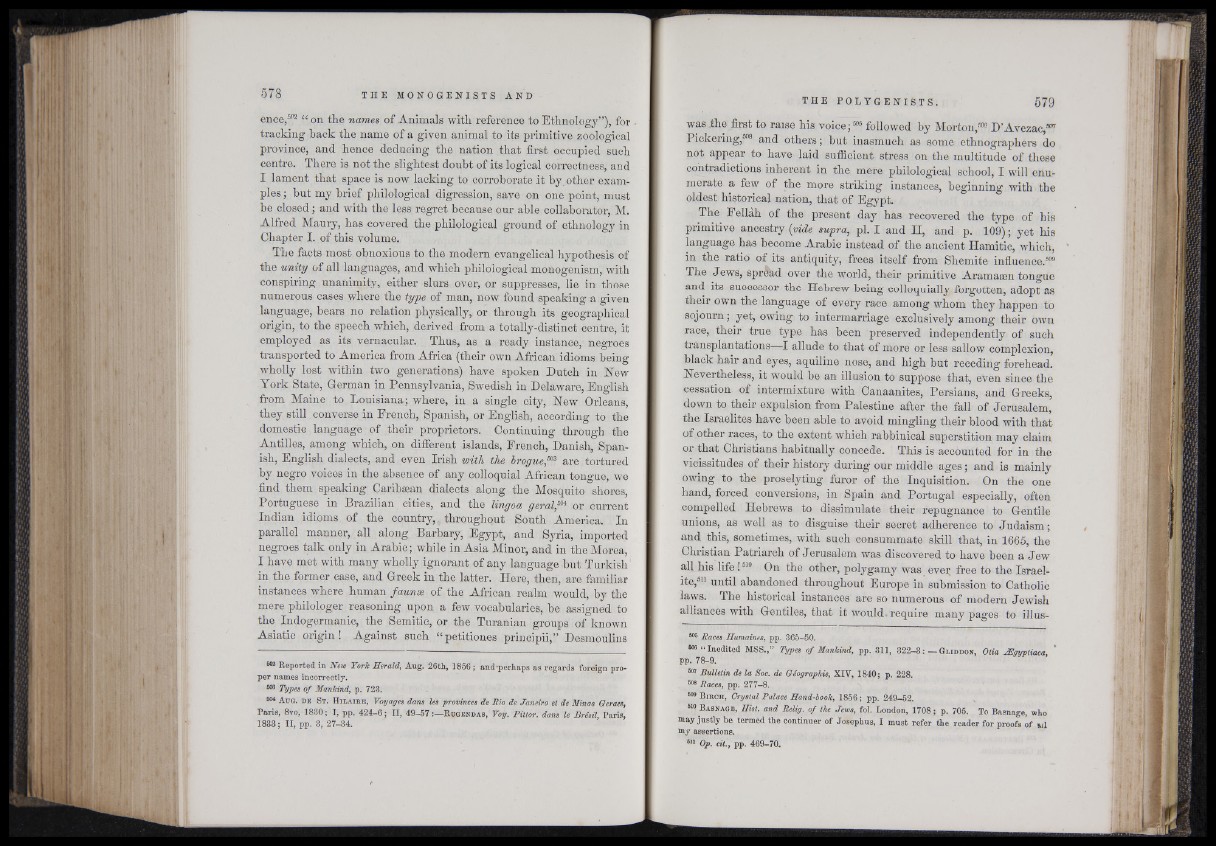
ence,502 “ on the names of Animals with reference to Ethnology”), for
tracking hack the name of a given animal to its primitive zoological
province, and hence deducing the nation that first occupied such
centre. There is not the slightest doubt of its logical correctness, and
I lament that space is now lacking to corroborate it by other examples
; but my brief philological digression, save on one point, must
be closed; and with the less regret because our able collaborator, M.
Alfred Maury, has covered the philological ground of ethnology in
Chapter I. of this volume.
The facts most obnoxious to the modern evangelical hypothesis of
the unity of all languages, and which philological monogenism, with
conspiring unanimity, either slurs over, or suppresses, lie in those
numerous cases where the type of man, now found speaking a given
language, bears no relation physically, or through its geographical
origin, to the speech which, derived from a totally-distinct centre, it
employed as its vernacular. Thus, as a ready instance, negroes
transported to America from Africa (their own African idioms being
wholly lost within two generations) have spoken Dutch in Hew
York State, German in Pennsylvania, Swedish in Delaware, English
from Maine to Louisiana; where, in a single city, New Orleans,
they still converse in French, Spanish, or English, according to the
domestic language of their proprietors. Continuing through the
Antilles, among which, on different islands, French, Danish, Spanish,
English dialects, and even Irish with the brogue,m are tortured
by negro voices in the absence of any colloquial African tongue, we
find them speaking Caribsean dialects along the Mosquito shores,
Portuguese in Brazilian cities, and the lingoa g e r a l or current
Indian idioms of the country,,, throughout South America. In
parallel manner, all along Barbary, Egypt, and Syria, imported
negroes talk only in Arabic; while in Asia Minor, and in the Morea,
I have met with many wholly ignorant of any language -but Turkish
in the former case, and Greek in the latter. Here, then, are familiar
instances where human faunae of the African realm would, by the
mere philologer reasoning upon a few vocabularies, be assigned to
the Indogermanic, the Semitic, or the Turanian groups of known
Asiatic origin! Against such “ petitiones principii,” Desmoulins
603 Reported in New York Herald, Aug. 26th, 1856; and-perhaps as regards foreign pro-
per names incorrectly.
608 Types of Mankind, p. 723.
604 A u g . d e S t . H i l a i r e , Voyages dans lés provinces de Rio de Janeiro et de Minas Oeraes,
Paris, 8vo, 1830 ; I, pp. 424-6 ; II, 49—57 :—R u g e n d a s , Voy. Pittor. dans le Brésil, Paris,
1833; II, pp. 3, 27-34.
was ihe first to raise his voice;505 followed by Morton,500 D’Avezac,507
Pickering,508 and others; but inasmuch as some ethnographers do
not appear to have laid sufficient stress on the multitude of these
contradictions inherent in the mere philological school, I will enumerate
a few of the more striking instances, beginning with the
oldest historical nation, that of Egypt.
The Fellah of the present day has recovered the type of his
primitive ancestry (vide supra, pl. I and H, and p. 109) ; yet his
language has become Arabic instead of the ancient Hamitic, which,
in the ratio of its antiquity, frees itself from Shemite influence.509
The Jews, sprlad over the world, their primitive Aramaæn tongue
and its successor the Hebrew being colloquially forgotten, adopt as
their own the language of every race among whom they happen to
sojourn ; yet, owing to intermarriage exclusively among their own
race, their true type has been preserved independently of such
transplantations—I allude to that of more or less sallow complexion,
black hair and eyes, aquiline nose, and high but receding forehead.
Nevertheless, it would be an illusion to suppose that, even since the
cessation of intermixture with Canaanites, Persians, and Greeks,
down to their expulsion from Palestine after the fall of Jerusalem,
the Israelites have been able to avoid mingling their blood with that
of other races, to the extent which rabbinical superstition may claim
or that Christians habitually concede. This is accounted for in the
vicissitudes of their history during our middle ages ; and is mainly
owing to the proselyting furor of the Inquisition. On the one
hand, forced conversions, in Spain and Portugal especially, often
compelled Hebrews to dissimulate their repugnance to Gentile
unions, as well as to disguise their secret adherence to Judaism;
and this, sometimes, with such consummate skill that, in 1665, the
Christian Patriarch of Jerusalem was discovered to have been a Jew
all his life !510 On the other, polygamy was ever free to the Israelite,
511 until abandoned throughout Europe in submission to Catholic
laws. The historical instances are so numerous of modern Jewish
alliances with Gentiles, that it would, require many pages to illus-
605 Races Humaines, pp. 366—50.
508 “ Inedited M S S . , ” Types of Mankind, pp. 311, 322-3 G l id d o h , Olia Ægyptiaca,
pp. 78-9.
507 Bulletin de la Soe. de Géographie, XIV, 1840; p. 228.
508 Races, pp. 277-8.
609 B ir c h , Crystal Palace Hand-book, 1856; pp. 249-52.
610 B a s n a g e , Hist, and Relig. of the Jews, fol. London, 1708 ; p. 705. To Basnage, who
may justly be termed the continuer of Josephus, I must refer the reader for proofs of »d
my assertions.
611 Op. cit., pp. 469-70.